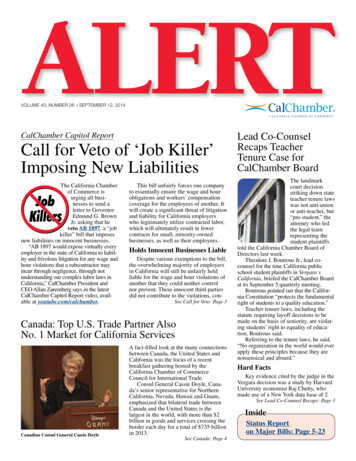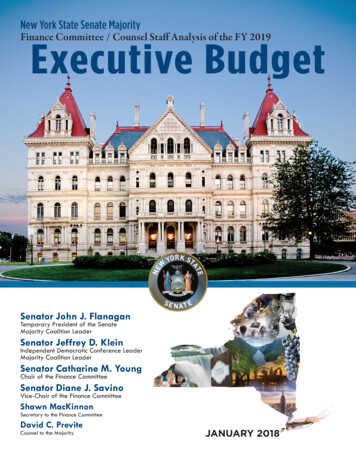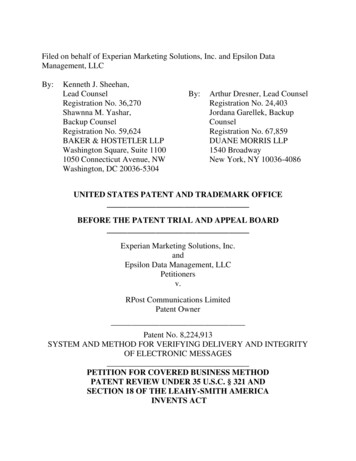
Transcription
VOLUME 40, NUMBER 26 SEPTEMBER 12, 2014CalChamber Capitol ReportCall for Veto of ‘Job Killer’Imposing New LiabilitiesThe California Chamberof Commerce isurging all businesses to send aletter to GovernorEdmund G. BrownJr. asking that heveto AB 1897, a “jobkiller” bill that imposesnew liabilities on innocent businesses.“AB 1897 would expose virtually everyemployer in the state of California to liability and frivolous litigation for any wage andhour violations that a subcontractor mayincur through negligence, through notunderstanding our complex labor laws inCalifornia,” CalChamber President andCEO Allan Zaremberg says in the latestCalChamber Capitol Report video, available at youtube.com/calchamber.This bill unfairly forces one companyto essentially ensure the wage and hourobligations and workers’ compensationcoverage for the employees of another. Itwill create a significant threat of litigationand liability for California employerswho legitimately utilize contracted labor,which will ultimately result in fewercontracts for small, minority-ownedbusinesses, as well as their employees.Holds Innocent Businesses LiableDespite various exemptions to the bill,the overwhelming majority of employersin California will still be unfairly heldliable for the wage and hour violations ofanother that they could neither controlnor prevent. These innocent third partiesdid not contribute to the violations, conSee Call for Veto: Page 3Canada: Top U.S. Trade Partner AlsoNo. 1 Market for California ServicesCanadian Consul General Cassie DoyleA fact-filled look at the many connectionsbetween Canada, the United States andCalifornia was the focus of a recentbreakfast gathering hosted by theCalifornia Chamber of CommerceCouncil for International Trade.Consul General Cassie Doyle, Canada’s senior representative for NorthernCalifornia, Nevada, Hawaii and Guam,emphasized that bilateral trade betweenCanada and the United States is thelargest in the world, with more than 2billion in goods and services crossing theborder each day for a total of 735 billionin 2013.See Canada: Page 4Lead Co-CounselRecaps TeacherTenure Case forCalChamber BoardThe landmarkcourt decisionstriking down stateteacher tenure lawswas not anti-unionor anti-teacher, but“pro student,” theattorney who ledthe legal teamrepresenting thestudent plaintiffstold the California Chamber Board ofDirectors last week.Theodore J. Boutrous Jr., lead cocounsel for the nine California publicschool student plaintiffs in Vergara v.California, briefed the CalChamber Boardat its September 5 quarterly meeting.Boutrous pointed out that the California Constitution “protects the fundamentalright of students to a quality education.”Teacher tenure laws, including thestatute requiring layoff decisions to bemade on the basis of seniority, are violating students’ right to equality of education, Boutrous said.Referring to the tenure laws, he said,“No organization in the world would everapply these principles because they arenonsensical and absurd.”Hard FactsKey evidence cited by the judge in theVergara decision was a study by HarvardUniversity economist Raj Chetty, whomade use of a New York data base of 2See Lead Co-Counsel Recaps: Page 3InsideStatus Reporton Major Bills: Page 5-23
SEPTEMBER 12, 2014 PAGE 2CALIFORNIA CHAMBER OF COMMERCELabor Law CornerNo Need to Reverify Expired Green Cards (Permanent Resident Cards)Sunny LeeHR AdviserIn auditing our I-9 file, we found that anemployee has an expired green card. Canwe require that she provide a current card?No. Unlike other work authorizationdocuments, a green card (PermanentResident Card) gives an employee theequivalent status of a U.S. citizen andCalifornia Chamber OfficersAnne BuettnerChairJoseph M. OttingFirst Vice ChairMichael W. MurphySecond Vice ChairSusan Corrales-DiazThird Vice ChairFrederick E. HitchcockImmediate Past ChairAllan ZarembergPresident and Chief Executive Officerthere is no need to update or reverify anew card as long as that employeeremains employed with you.Although Permanent Resident Cardsdo have an expiration date, according tothe U.S. Citizenship and ImmigrationServices (USCIS) I-9 Employer Handbook, employers may not ask to see anew document or reverify an expireddocument.In response to this question the Handbook states:“You may not reverify an expired U.S.passport or passport card, an Alien Registration Receipt Card/Permanent ResidentCard (Form I-551), or a List B documentthat has expired.”Potential Discrimination ClaimAn employer that has a practice ofreverifying documents for permanentresidents may face a discrimination claimunder the Immigration Naturalization Act(INA) as employers are prohibited fromtreating permanent residents differentlythan U.S. citizens.The Office of Special Counsel forImmigration-Related Unfair EmploymentPractices (OSC) under the U.S. JusticeDepartment is in charge of enforcing thediscrimination provisions of the INA.Civil PenaltiesRecent settlements with that agencyhave resulted in significant back pay andcivil penalties. In one settlement reportedby the OSC, a company agreed to pay 100,000 to compensate affected workersand 175,000 in civil penalties becausethe company was asking those employeesworking with expired green cards topresent new documents.U.S. citizens, permanent residents andauthorized aliens do not need to presentnew documents during their employment.Employers also need to be careful to notrequest additional documents from applicants who provide I-9 acceptable documents. Both of these situations pose a riskof discrimination litigation.The Labor Law Helpline is a service toCalifornia Chamber of Commerce preferredand executive members. For expert explanations of labor laws and Cal/OSHA regulations, not legal counsel for specific situations,call (800) 348-2262 or submit your questionat www.hrcalifornia.com.CalChamber Board Hears Fox News Journalist,California Transportation Agency SecretaryAlert (ISSN 0882-0929) is published weeklyduring legislative session with exceptions byCalifornia Chamber of Commerce, 1215 KStreet, Suite 1400, Sacramento, CA 958143918. Subscription price is 50 paid throughmembership dues. Periodicals Postage Paid atSacramento, CA.POSTMASTER: Send address changes to Alert,1215 K Street, Suite 1400, Sacramento, CA95814-3918. Publisher: Allan Zaremberg.Executive Editor: Ann Amioka. Associate Editor:Sara Espinosa. Art Director: Neil Ishikawa.Capitol Correspondent: Christine Haddon.Permission granted to reprint articles ifcredit is given to the California Chamber ofCommerce Alert, and reprint is mailed to Alertat address above.Email: alert@calchamber.com.Home page: www.calchamber.com.Fox News journalist and commentator Tucker Carlson(left) shares the stage following his introduction at theCalChamber Board of Directors recent dinner by AnneBuettner, CalChamber Board chair, a senior vicepresident of The Walt Disney Company, assisted byMickey Mouse. Assessing the national political scene,Carlson predicts a “zany primary season.”Brian Kelly, secretary of the CaliforniaTransportation Agency, presents theCalChamber Board of Directors with anoverview of the administration’stransportation priorities. He credits theagency’s “fix-it first” policy withsignificantly improving pavementconditions on the state’s highways.
CALIFORNIA CHAMBER OF COMMERCESEPTEMBER 12, 2014 PAGE 3Lead Co-Counsel Recaps Teacher Tenure Case for CalChamber BoardFrom Page 1million students, along with tax recordsof students and parents (anonymous) and18 million test results.The study found that a year in a classroom with one grossly ineffective teachercost students in that class 1.4 million inlifetime earnings.Chetty testified in court that having ahighly effective teacher significantlyimproves children’s outcomes.Among the personal stories revealedin court testimony was the case of aSacramento teacher, who was namedteacher of the year in Sacramento County,but received a layoff notice eight monthslater because of her junior teacher status.A Sacramento school superintendenttold of how a teacher who impressed himso much he was happy to enroll his son inher first grade class was laid off, and hehad no choice but to approve the layoffbecause of the tenure rules. “A systemthat treats its best teachers this way isbroken,” he told the court.Harm to StudentsTheodore J. Boutrous Jr. briefs the CalChamberBoard of Directors about the Los Angeles courtdecision striking down teacher tenure laws,Vergara v. California Highlights, includingvideos of testimony and updates on related newsappear at http://studentsmatter.org.Looking at the effects of the teachertenure law, Boutrous said, it was clearthat kids are getting unequal education.Students in minority and low-incomeschool districts were disproportionatelyaffected, as those districts were morelikely to have grossly ineffective teachersin the classroom and less senior teacherswho would be the first to be laid off whena district encountered budget difficulties.In his June 10 ruling, Judge Rolf M.Treu agreed with the student plaintiffsthat five provisions of the state EducationCode relating to tenure and dismissal ofpublic school teachers are unconstitutional. The impact of grossly ineffectiveteachers on students “shocks the conscience,” he wrote.The ruling was finalized on August28. The next day, California AttorneyGeneral Kamala Harris filed the appeal ofthe decision for Governor Edmund G.Brown Jr. and Superintendent of PublicInstruction Tom Torlakson.Students MatterInformation about the case, includingvideos of testimony and updates onrelated news, appears on the website forStudents Matter, the nonprofit organization that assisted with the lawsuit, http://studentsmatter.org.Call for Veto of ‘Job Killer’ Imposing New Liabilitiesengage in labor law violations. In aneffort to combat this statistic, Labortrol the working conditions, controlCommissioner Julie Su launched athe manner of payment, dictate thestatewide wage theft campaign onemployees’ schedules, or even conApril 30, 2014, to educate minoritytrol the work environment, and yetowned businesses as well as employunder AB 1897 they will be heldees about existing labor laws and howliable.to comply with the law.“The consequence of this legislaCalChamber supports this effort bytion is that employers will no longerthe Labor Commissioner as it priorihire small businesses that are mosttizes education for small businesses,likely to incur wage and hour violawho want to be compliant, yet lacktions, merely because they don’tCalChamber President and CEO Allan Zaremberg summarizes the understanding as to how to complyunderstand our complex laws,” saysreasons to oppose AB 1897 (R. Hernández; D-West Covina).with the law. It also targets the identiZaremberg. “Those employees andfied problem of wage and hour violathose small businesses will no longeremployer in the state.tions, instead of shifting the liability for ahave the opportunity to provide augmen“The solution is to provide a campaignnoncompliant business’s wage and hourtation to an employer’s workforce.”to make sure that small business underviolations to a compliant business, as ABstandsourcomplexlaws,”hesays.“ItisEducation Campaign Needed1897 proposes.not a solution to expose every employer inGiven the complexity of California’sthe state of California to frivolous litigaAction Neededexisting wage and hour laws, violationstion and liability for mistakes made by anThe CalChamber is urging businessesgenerally are due to lack of understandunknowing small business.”to write Governor Brown and ask him toing as to how the laws should be interAs noted in the May 2013 Division ofveto AB 1897. An easy-to-edit samplepreted or implemented. ZarembergLabor Standards Enforcement annualletter is available.explains that the answer is to educatereport, small businesses that are underStaff Contact: Jennifer Barrerabusinesses, not punish every legitimatecapitalized are typically the entities thatFrom Page 1
SEPTEMBER 12, 2014 PAGE 4CALIFORNIA CHAMBER OF COMMERCECanada: Top U.S. Trade Partner Also No. 1 Market for California ServicesFrom Page 1The North American Free Trade Agreement (NAFTA), which went into effect 20years ago, has been “wildly successful,”Doyle said. Trade within North Americahas exploded from 290 billion to 1.1trillion in the last two decades.Since NAFTA went into force California’s exports to Canada and Mexico haveincreased by 30 billion, with Canadaaccounting for a third ( 10.5 billion),according to the Business Roundtable.Doyle went on to point out howhighly integrated the U.S. and Canadianeconomies are. “We not only sell thingsto each other; we build things together,”she said.For example, Canadian wheat is usedto bake American bread; U.S. meat packers package meat from Canada; and Canadian malt is used to brew American beer.EnergyA prime example of integrationbetween the two nations is energy infrastructure. Canada is the leading source ofenergy used in the United States, be it oil,natural gas, electricity or uranium forU.S. nuclear power plants.The electricity grid is highly integrated, Doyle added, with electricityconstantly going back and forth as theUnited States and Canada supply nearlyall of each other’s electricity.Canada also supplies 12% of thenatural gas consumed in the United Statesand is the country’s largest supplier of oil.California JobsMore than 1.1 million California jobsdepend on trade with Canada, Doyle said,and 41,200 Californians are employed byCanadian-owned businesses.In 2013, merchandise trade betweenCalifornia and Canada reached 45billion, she added.California exports 19 billion ofgoods to Canada, making it the state’ssecond largest export market.When it comes to California services,however, Canada is the state’s largestexport market. The value of services goingnorth totals 8 billion annually, so totaltrade in goods and services comes to 27billion to 28 billion a year, Doyle said.Canada is the largest export marketfor California agriculture, she said.California almonds have been wellreceived in Canada, with 2013 exportsshowing an 80% increase over 2010figures.Moreover, “Canadians love Californiawine,” Doyle observed. Canada is thesecond largest export market for California wine, after the European Union, shesaid, with exports up 12% in 2013 compared to 2012.Busy BorderKeys to the U.S.-Canada trade relationship, Doyle emphasized, are highlyefficient borders and regulatory harmony.She cited efforts underway to speed thetransport of goods and people across theU.S.-Canada border building on the actionplans announced in December 2011 byCanadian Prime Minister Stephen Harperand U.S. President Barack Obama.She emphasized the importance ofkeeping the borders open, acknowledgingCalChamber support favoring free tradeover protectionist efforts that disruptsupply chains.Examples of the job benefits of opensupply chains, Doyle said, are the contracts won by Siemens of Sacramento.Last September, Siemens received acontract to build light rail vehicles forCalgary Transit; several years ago thecompany was awarded a contract to buildlight rail cars for the City of Edmonton.Tourism is another strong aspect ofthe Canada-California relationship, Doylecontinued. Travel statistics show 400,000people cross the U.S.-Canada border eachday.In 2012, Canadians accounted formore than 1.8 million visits to California,spending 1.5 billion. Nearly 1 millionvisits to Canada were from Californians,who spent 603 million.Trading Partner PortalMore information about the CanadaCalifornia trade and investment relationshipis available at calchamber.com/canada.Staff Contact: Susanne StirlingCalChamber Positions on November Ballot MeasuresPropositionSubjectPositionProposition 1. Water supply/storage bond.SupportProposition 2. State budget stabilization; rainy day reserve.SupportProposition 45. Insurance Commissioner approval of health care rate changes. OpposeProposition 46. Increase pain/suffering cap in medical malpractice lawsuits. OpposeProposition 47. Reduced penalties for drug/property offenses. OpposeProposition 48. Referendum on Indian gaming compacts. No PositionMore information about CalChamber positions will appear in a future Alert.
CALIFORNIA CHAMBER OF COMMERCESEPTEMBER 12, 2014 PAGE 5CalChamber Status Update Reporton Major Legislation for BusinessThe following list summarizes toppriority bills for the California Chamberof Commerce and their status as ofAugust 31, when the Legislature beganits final recess.Within each subject area, the listpresents bills in order of priority with thehighest priorities at the top.September 30 is the last day for theGovernor to sign or veto bills passed bythe Legislature on or before August 31.The CalChamber will publish its finalstatus report, showing the ultimate fate ofbills sent to the Governor this year, onOctober 3.Bills signed by the Governor willbecome law on January 1, 2015. Urgencyand budget-related measures go intoeffect immediately upon being signed.Each fall, the CalChamber also publishes a record of legislators’ votes on keybills affecting the California businessclimate. Generally, the bills selected forthe vote record have appeared in one of thestatus reports. This year’s vote record isscheduled to be published on October 17.Federal bills are marked with an *.Status of bills as of August 31, 2014, except where noted. Dates listed are the date the bill was assigned to a committee, the latest dateof committee action, the next hearing date or when the bill reached the floor, unless action is stated.Subject—CalChamber PositionStatusAgriculture and Natural ResourcesCalifornia-Only New Labeling Requirements and Increased Litigation. SB 1381 (Evans;D-Santa Rosa) Increases cost of food productions and increases frivolous litigation by forcingfarmers and food companies to implement costly new labeling, packaging, distribution andrecordkeeping for products sold in California. Latest amendments remove private right of action thatwould have led to increased litigation on all entities in the supply chain if a product was not properlylabeled. “Job killer” tag removed, but CalChamber still opposes. Oppose/Former Job Killer.Failed Passage in Senate5/29/14California-Only New Labeling Requirements and Increased Litigation. SB 1040 (Evans;D-Santa Rosa) Increases cost of food productions and increases frivolous litigation by forcingfarmers and food companies to implement costly new labeling, packaging, distribution andrecordkeeping for products sold in California. Oppose.Assembly Agriculture6/23/14; Failed DeadlineCoastal Commission Enforcement. AB 976 (Atkins; D-South Park/Golden Hill) Inappropriatelyexpands the Coastal Commission’s enforcement authority by allowing the commission to imposeadministrative civil penalties and incentivizes the imposition of fines and penalties at the expense ofdue process that occurs in the judicial system. Oppose.Assembly ConferenceCommittee 1/7/14; FailedDeadlineCounty Planning. AB 1961 (Eggman; D-Stockton) Imposes a new county land use mandate todevelop sustainable farmland strategy that includes mapping agricultural lands and mitigation forloss. Oppose.Held in AssemblyAppropriations SuspenseFile 5/23/14; Failed DeadlineDue Process for Agricultural Employers. SB 25 (Steinberg; D-Sacramento) Denies due process foragricultural employers by requiring employer to implement collective bargaining contract ordered bythe Agricultural Labor Relations Board while appealing the order, unless the employer meets a highstandard to win a stay. Oppose.To GovernorCoastal Leases. SB 1096 (Jackson; D-Santa Barbara) Deletes a narrow but important exemption togranting gas and oil leases in the coastal zone, which is necessary for the rare instance when adjacentfederal leases are draining state resources. Oppose.Senate Floor 8/18/14; FailedDeadlineExtend Sunset Date. AB 2075 (Alejo; D-Salinas) Fosters economic growth in the retail, fashion anddesign industries by extending the sunset on imports of certain reptile skins to January 2025. Support.To GovernorPenalties. AB 1722 (Bigelow; R-O’Neals) Deters livestock theft by imposing a 1,000 per head fineand prohibiting a violator from registering a brand. Support.Chapter 129
SEPTEMBER 12, 2014 PAGE 6CALIFORNIA CHAMBER OF COMMERCESubject—CalChamber PositionStatusLivestock. AB 1437 (Mullin; D-South San Francisco) Interferes with business managementdecisions regarding the health of farm animals. Bans use of antibiotics unless prescribed by aveterinarian. Oppose.Assembly Agriculture4/23/14; Failed DeadlineNew Requirements. SB 1087 (Monning; D-Carmel) Before amendments, expanded therequirements and increased the cost of a farm labor contractor’s license. Unfairly made public thecontent of a contract for labor between a grower and a farm labor contractor. Opposition removeddue to 5/27/14 amendments. Neutral.To GovernorBanking/FinanceUniform Commercial Code Amendments. AB 1858 (Perea; D-Fresno) Minimizes current documentation needed to verify the identity of a business borrower by allowing use of an alternative means ofidentification in a commercial lending transaction that is common practice in 37 other states. Support.Chapter 284Technology. AB 2209 (Dickinson; D-Sacramento) Accommodates use of new technologies and themovement toward online and mobile apps for the transmittal of funds by updating the MoneyTransmitters Act. Support.To GovernorProperty Titles. AB 1698 (Wagner; R-Irvine) Before amendments, inappropriately punished andstripped the rights of innocent third parties who finance or purchase real property and later discover thatthe underlying documents are false. Opposition removed due to 5/28/14 amendments. No Position.To GovernorCalifornia Environmental Quality Act (CEQA)Substantial Expansion of CEQA. AB 52 (Gatto; D-Los Angeles) Before amendments, createdsubstantially more opportunities for CEQA litigation and gave Native American Tribes veto authority over land use projects by allowing tribes to determine what tribal resources required protectionand mitigation under CEQA. Opposition and “job killer” status removed due to 8/22/14 amendments. No Position/Former Job Killer.To GovernorSubstantially Reduces Cost and Delay in the CEQA Process. SB 1451 (Hill; D-San Mateo)Significantly limits use of the “document dumping” tactic in CEQA cases, wherein projectopponents seek to intentionally delay project approvals by submitting lengthy, detailed commentletters and extensive documentation on the day of the public hearing. Support.Senate Judiciary 5/1/14;Failed DeadlineExpedites and Reduces Cost for Levee Construction Projects. AB 1849 (Logue; R-Marysville)Streamlines infrastructure development by exempting levee maintenance, repair, or replacementprojects from CEQA review. Support.Assembly Natural Resources2/27/14; Failed DeadlineExpedites and Reduces Cost for Infill Development. SB 674 (Corbett; D-San Leandro)Streamlines infill development by expanding the variety of mixed-use developments that may qualifyfor CEQA’s infill exemption. Support.To GovernorLimits CEQA Litigation. SB 834 (Huff; R-Diamond Bar) Streamlines the CEQA process andprovides certainty for employers seeking to expand in California by prohibiting litigation overaspects of a project that meet all existing state, local, and federal environmental standards. Support.Senate EnvironmentalQuality 3/20/14; FailedDeadlineExpedites and Reduces Cost for Recycled Water Pipeline Projects. AB 2417 (Nazarian;D-Sherman Oaks) Streamlines infrastructure development by exempting certain recycled waterpipeline installation and maintenance projects from CEQA review. Support.Senate EnvironmentalQuality 6/5/14; FailedDeadlineClarifies Writ of Mandate Procedure in CEQA Cases. AB 515 (Dickinson; D-Sacramento)Before amendments, taxed already-limited judicial resources by establishing a land-use division inthe court system to try and expedite CEQA and other permitting cases. Opposition removed due to1/6/14 amendments. Now, directs courts to be specific in identifying the issue or activities a leadagency needs to address in order to comply with a court ruling in a CEQA case. No Position.Senate EnvironmentalQuality 6/5/14; FailedDeadline
CALIFORNIA CHAMBER OF COMMERCESEPTEMBER 12, 2014Subject—CalChamber PositionStatusCostly New CEQA Requirement. AB 543 (Campos; D-San Jose) Before amendments, increasedthe cost and burden of development, and exposed lead agencies and project proponents to newlawsuits by requiring them to translate CEQA notices into all languages spoken by 25% or more ofthe individuals located at or near an area of the proposed project. Opposition removed due to 6/18/14amendments. No Position.To Governor PAGE 7Climate ChangeIncreased Fuel Costs. SB 1156 (Steinberg; D-Sacramento) Increases costs for businesses andconsumers throughout the state by imposing a carbon tax on gasoline at the pump. Oppose.Senate Governance andFinance 3/6/14; FailedDeadlineAB 32 Extension. SB 1125 (Pavley; D-Agoura Hills) Threatens California businesses withadditional regulation and increased costs by directing the California Air Resources Board to developrecommendations and a timetable for greenhouse gas and short-lived climate pollutant reductionstrategies beyond 2020 without including a comprehensive economic analysis. Oppose UnlessAmended.Held in SenateAppropriations SuspenseFile 5/23/14; Failed DeadlineDelays Fuel Price Increase. AB 69 (Perea; D-Fresno) Helps to keep costs for California businessesand consumers down by delaying the inclusion of motor vehicle fuels in the cap and trade programfor three years. Support.Senate Rules 7/3/14; FailedDeadlineImproves AB 32 Compliance Mechanisms. AB 985 (Cooley; D-Rancho Cordova) Reducespotential for market manipulation and reduces unnecessary burdens to regulated entities by providingnecessary adjustments to cap and trade regulations. Support.Senate Rules 8/4/14; FailedDeadlineReduces Compliance Costs for AB 32. AB 2083 (B. Gaines; R-Rocklin) Reduces the cost of AB 32compliance and provides greater opportunities to meet compliance obligations by removinggeographic restrictions on offsets. Support.Failed Passage in AssemblyNatural Resources 4/8/14Increased Fuel Costs. AB 1992 (Quirk; D-Hayward) Creates an additional burdensome layer to theLow Carbon Fuel Standard by adding a new “very low carbon fuel” mandate. Oppose.Failed Passage in SenateTransportation and Housing6/26/14Premature AB 32 Auction Revenue Expenditures. SB 1122 (Pavley; D-Agoura Hills) Prematurelyallocates auction revenues to the Strategic Growth Council for grants and loans to implement thegoals of SB 375. Oppose.Held in SenateAppropriations SuspenseFile 5/23/14; Failed DeadlinePremature AB 32 Auction Revenue Expenditures. SB 1204 (Lara; D-Bell Gardens) Prematurelyallocates auction revenues to fund zero and near-zero emission truck and bus technologies. Oppose.To GovernorPremature AB 32 Auction Revenue Expenditures. SB 1268 (Beall; D-San Jose) Prematurelyallocates auction revenues to fund the Natural Resources Climate Improvement Program in order todevelop greenhouse gas reduction or sequestration projects. Oppose.Held in SenateAppropriations SuspenseFile 5/23/14; Failed DeadlineAB 32 Auction Revenue Expenditures. SB 64 (Corbett; D-San Leandro) Prematurely spends AB32 auction revenues to establish the Clean Technology Investment Fund for development,demonstration and deployment of technologies with the intent of reducing greenhouse gas emissions.Oppose.Held in AssemblyAppropriations SuspenseFile 8/14/14; Failed DeadlinePremature AB 32 Auction Revenue Expenditures. AB 2348 (Stone; D-Scotts Valley) Prematurelyallocates auction revenues to fund the Natural Resources Climate Improvement Program in order todevelop greenhouse gas reduction or sequestration projects. Oppose.Held in AssemblyAppropriations SuspenseFile 5/23/14; Failed DeadlinePremature AB 32 Auction Revenue Expenditures. AB 1970 (Gordon; D-Menlo Park) Prematurelyallocates auction revenues for local assistance grants for community-level greenhouse gas emissionreduction projects. Oppose.Held in AssemblyAppropriations SuspenseFile 5/23/14; Failed Deadline
SEPTEMBER 12, 2014 PAGE 8CALIFORNIA CHAMBER OF COMMERCESubject—CalChamber PositionStatusPremature AB 32 Auction Revenue Expenditures. AB 1447 (Waldron; R-Escondido) Prematurelyauthorizes AB 32 auction revenues to be used to fund the synchronization of traffic lights. Oppose.To GovernorPremature AB 32 Auction Revenue Expenditures. AB 1813 (Quirk; D-Hayward) Prematurelyallocates 100 million from the Greenhouse Gas Reduction Fund to establish the Fuel ProducersCapital Assistance Fund. Oppose.Assembly Natural Resources2/27/14; Failed DeadlineExpensive Regulatory Burdens. SB 605 (Lara; D-Huntington Park/Long Beach) Before amendments, created regulatory burdens and increased the cost of doing business in California by directingthe California Air Resources Board to create a new program to regulate short-lived climate pollutants. Opposition removed due to 8/29/14 amendments. No Position.To GovernorAB 32 Economic Analysis. AB 2050 (Quirk; D-Hayward) Before amendments, would have requireda comprehensive economic impact analysis to be prepared in order to guide the California AirResources Board and inform on the cost of AB 32 when submitting a proposal to the Legislature forfurther reducing greenhouse gas emissions. Support removed due to 6/30/14 amendments. Neutral.Held in Sena
Recaps Teacher Tenure Case for CalChamber Board The landmark court decision striking down state teacher tenure laws was not anti-union or anti-teacher, but "pro student," the attorney who led the legal team representing the student plaintiffs told the California Chamber Board of Directors last week. Theodore J. Boutrous Jr., lead co-











